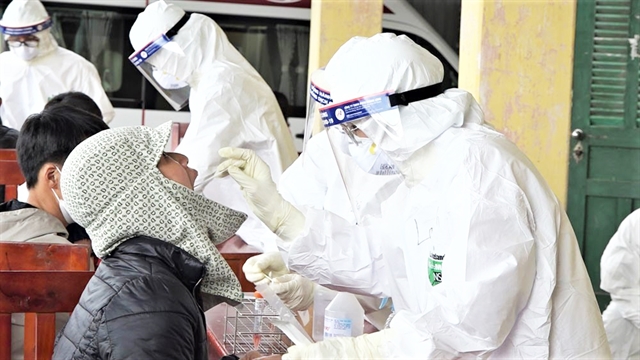 Society
Society

Trần Như Dương, Deputy Director National Institute of Hygiene and Epidemiology, who headed up the institute’s task force sent to Hải Dương Province – the current coronavirus epicentre in Việt Nam’s recent outbreaks – told the media that the highly transmissible variant of the virus demands utmost speed from health workers.

|
| Health workers in full protective suits collect nasal-throat samples from local residents of Kinh Môn township, the northern province of Hải Dương, to test for COVID-19 on January 1, 2021. — VNA/VNS Photo Mạnh Minh |
Trần Như Dương, Deputy Director of National Institute of Hygiene and Epidemiology, who headed up the institute’s task force sent to Hải Dương Province – the current coronavirus epicentre in Việt Nam’s recent outbreaks – told the media that the highly transmissible variant of the virus demands utmost speed from health workers.
How different is the current coronavirus that is hitting Hải Dương Province compared to the outbreak in Đà Nẵng last year?
The coronavirus that was spreading in Đà Nẵng last year was comparatively less contagious and has a longer transmission cycle, so there were not many cases where a carrier spread the virus to many others.
The virus that is making rounds in Hải Dương was determined to be the mutant variant that was first reported in the UK. This variant has stronger ability to ‘bind’ itself to human cells, and the transmission cycle is reduced to 2-3 days compared to roughly five days like before.
We are fighting a much more dangerous enemy now so speed is of the utmost importance. We have to act faster than the virus spreads – any slower and we lose the fight.
That’s why everyone involved is doing their best, racing against time, day and night, to beat the virus.
What are the recommendations for Hải Dương in tracing and sealing off affected areas?
Contact tracing is one vital factor. Everything has to be done fast – contact tracing, isolation, and testing – to ‘outrun’ the spread of the virus. Teams of contact tracers here have been working tirelessly, once they obtain new bits of information about places, times, people and activities related to the confirmed COVID-19 patient, they will immediately alert local authorities for them to carry out isolation, day or night.
You are the author of health ministry’s contact tracing handbook containing everything a contact tracer should know and forms to fill out. Has the handbook proved useful this time around?
We haven’t dealt with anything like COVID-19 before, so we really didn’t have much experience. In the beginning, it was a lot of learning as we went, but after the coronavirus outbreak in the northern province of Vĩnh Phúc’s Sơn Lôi Commune in March last year, health minister Nguyễn Thanh Long and Deputy Prime Minister Vũ Đức Đam (Head of the National Steering Committee for COVID-19 Control and Prevention) ordered a sort of guidelines synthesising the experience and lesson.
The handbook has been made available nationwide, and accompanying training courses have been held for authorities right down to the ward and commune level.
The handbook’s concise guidelines on the five steps to do make it really accessible to all, making contact tracing easier. Naturally nothing is perfect, but the handbook is open to updates and adjustments based on the practical experiences we get as we carry out the work. The many lessons in the handbook have been utilised effectively in dealing with outbreaks across the country, not just in Hải Dương this time.
The saying 'going to every alley, knocking on every door' has become associated with the health sector’s ‘motto’ on monitoring, isolating and suppressing the outbreaks. Where did that expression come from?
Back in 2007-08, there was a severe cholera outbreak in Trúc Sơn (Chương Mỹ - Hà Nội City), I was sent to deal with it. Cholera is highly infectious, and people have to maintain serious hygienic regimes, wash hands with soap, only eat well-cooked food and drink boiled water, and more importantly, take preventive antibacterial pills. But the health workers themselves then were not sure that the locals would take the pills? So we decided to set up working groups to send to each household to sort of check on them. This saying just popped up in my head during the training course for the local workers, I’m still not sure myself from where or whom I heard it. But I told everyone that “You must go to every alley, knock on very door to see if the people take the pills. You have to see them taking the pills with your own eyes, because this is vital in suppressing the cholera outbreak.” — VNS




